全新版大学英语综合教程Unit5-1教案、讲稿
大学英语综合教程 教案_U5

Innovation English Integrated Course Book 1Unit FiveRest Makes No WasteObjectivesStudents will be able to:1.Grasp the main idea (that the body needs rest for the sake of the brain) and structure of the text (introduction of the topic by the nap of subway riders; development of the article by Roenneberg’s study; conclusion of the article by a statement);2.Appreciate how the author achieves coherence of the essay;3.Acquire the key language points and grammatical structures in the text;4.Participate in a series of reading, listening, speaking and writing activities related to the theme of the unit.Suggested Teaching StepsLead-inText A➢Word Study➢Sentence Study➢StructureAfter-readingAdditional materialsLead-inDirections: The pictures below depict some unhealthy habits. Please talk about their possible outcomes.Directions: A healthy lifestyle leaves you fit, energetic and at reduced risk of disease. Please list the habits you think contribute to a healthy lifestyle, and the reasons for your choices.Text A: Let the Body Rest, for the Sake of the Brain.I’m sure a lot of subway riders are skilled nappers. Going over the Brooklyn Bridge on a recent morning, just as the sun was coming up, a row of men in black suits held onto the handrails with their eyes closed.(Explanation: Sentence 1) Their necks were bent at the slightest of angles, like a row of daisies in a breeze,and as the sun pierced through the train windows, it finally dawned on me they were all sound asleep. (Explanation:Sentence 2) Not even the light could stop them from sneaking in 15 more minutes of shut-eye before work.We take it for granted, but most people have to wake up for work or school long before they want to. Sleeping in is treated as a cherished luxury —it’s somehow become normal that people wake up still exhausted.(Explanation:Sentence 3)But rising before the body wants to affects not only mood and energy, but brain function aswell.(Explanation:Sentence 4)“The practice of going to sleep and waking up at 'unnatural’ times could be the most common high-risk behavior in modern society,” writes Till Roenneberg, a professor at the Institute of Medical Psychology at Ludwig-Maximilians University in Munich.In fact, according to Roenneberg’s study, about one-third of people are required to wake up two hours before their “natural waking times”, and 69 percent of people have to wake up one hour before their bodies would like them to.Of course, different people require different amounts of sleep and although there's no universal rule for how long we should all be sleeping, it’s becoming increasingly clear that working late and waking early can cause serious problems.(Explanation:Sentence 5) Just one restless night can seriously affect us in the morning.Getting less than five hours of sleep a night makes people dumber and less able to concentrate, and it can make people more likely to have false memories. In the classroom, students who sleep more in the previous day tend to be better at remembering what they've learned than those who slept less, according to a 2001 study published in Science, and a 2014 study confirmed that more sleep leads to higher exam scores as well.(Explanation:Sentence 6) Students who slept seven hours the night before an exam that tested them on economics, languages, and math, scored an average of 9 percent higher than students who only slept six hours the night before.(Explanation:Sentence 7) But there is the possibility of overriding the mind and body’s desire for sleep. (Explanation:Sentence 8) By simply telling themselves they've slept well, studies show that people can temporarily trick their brains. Of course, continually getting too few hours of shut-eye will eventually cause problems, but telling yourself you got more sleep and that you feel refreshed (even if you don’t) leads to better performance in the morning. (Explanation:Sentence 9) The sleeping subway riders were also onto something. Even after a terrible night’s sleep, a 10-minute nap can significantly increase short-term alertness and improve problem-solving skills. (Explanation:Sentence 10)As we reached the Chambers Street subway station,the row of suited men and women seemed to instinctively know that they had arrived at their stop. They began to open their eyes and force themselves awake. Some gave themselves little slaps on their cheeks; others rubbed their eyes.Then, their backs straightened, their gazes turned straight ahead and they grasped their brief cases and stepped out the door, up the stairs, and out onto the street already noisy and awake.Word StudyWord Study: piercepierce: v. if sound or light pierces sth., you suddenly hear or see it (声或光)穿过,透入e.g. A sudden scream pierced the silence.突如其来的一声尖叫划破了寂静。
unit5全新版大学英语第二版一册教案.doc
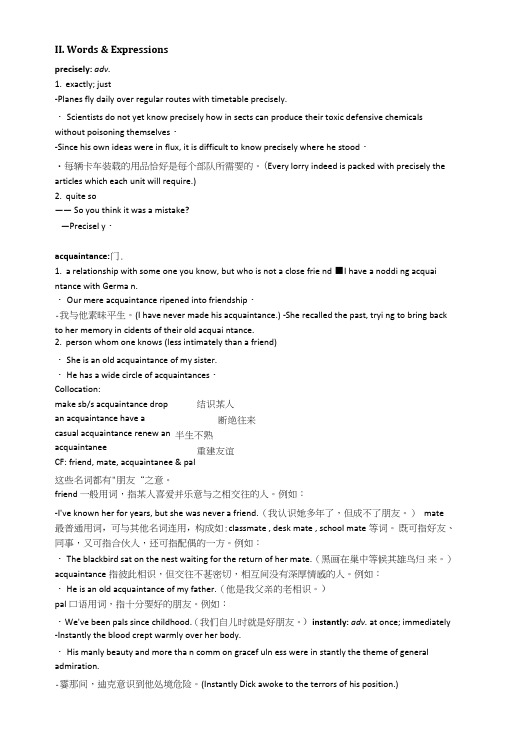
II. Words & Expressionsprecisely: adv.1. exactly; just-Planes fly daily over regular routes with timetable precisely.・ Scientists do not yet know precisely how in sects can produce their toxic defensive chemicals without poisoning themselves ・-Since his own ideas were in flux, it is difficult to know precisely where he stood ・・每辆卡车装载的用品恰好是每个部队所需要的。
(Every lorry indeed is packed with precisely the articles which each unit will require.)2. quite so—— So you think it was a mistake?—Precisel y ・acquaintance:门.1. a relationship with some one you know, but who is not a close frie nd ■I have a noddi ng acquai ntance with Germa n.・ Our mere acquaintance ripened into friendship ・-我与他素昧平生。
(I have never made his acquaintance.) -She recalled the past, tryi ng to bring back to her memory in cidents of their old acquai ntance.2. person whom one knows (less intimately than a friend)・ She is an old acquaintance of my sister.・ He has a wide circle of acquaintances ・Collocation:make sb/s acquaintance drop an acquaintance have a casual acquaintance renew an acquaintanee CF: friend, mate, acquaintanee & pal这些名词都有"朋友“之意。
大学英语综合教程教案Book1Unit5
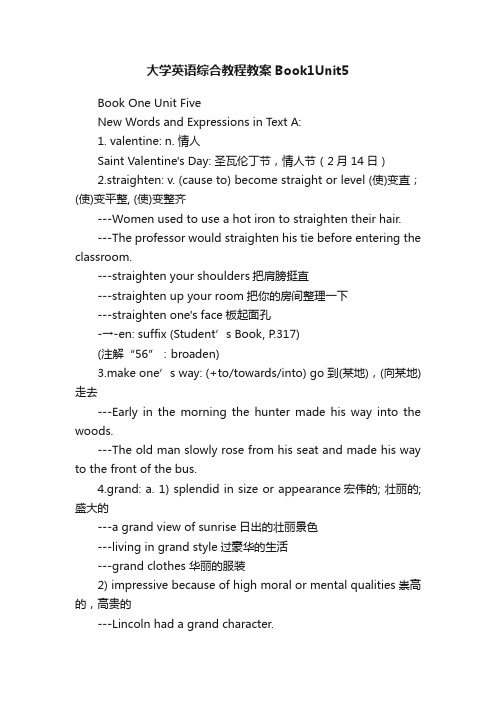
大学英语综合教程教案Book1Unit5Book One Unit FiveNew Words and Expressions in Text A:1. valentine: n. 情人Saint Valentine's Day: 圣瓦伦丁节,情人节(2月14日)2.straighten: v. (cause to) become straight or level (使)变直;(使)变平整, (使)变整齐---Women used to use a hot iron to straighten their hair.---The professor would straighten his tie before entering the classroom.---straighten your shoulders把肩膀挺直---straighten up your room把你的房间整理一下---straighten one's face板起面孔-→-en: suffix (Student’s Book, P.317)(注解“56”:broaden)3.make one’s way: (+to/towards/into) go 到(某地),(向某地)走去---Early in the morning the hunter made his way into the woods.---The old man slowly rose from his seat and made his way to the front of the bus.4.grand: a. 1) splendid in size or appearance宏伟的; 壮丽的; 盛大的---a grand view of sunrise日出的壮丽景色---living in grand style过豪华的生活---grand clothes 华丽的服装2) impressive because of high moral or mental qualities崇高的,高贵的---Lincoln had a grand character.---grand ladies贵妇3) full, complete完全的;总的---the grand total全部;总共4) of most or greatest importance最重要的--- the grand ballroom of a hotel 旅馆的主舞厅5) wonderful or very pleasing 愉快的,令人非常高兴的---had a grand time度过美好时光5.absorb: vt. 1) (be absorbed in) completely hold the attention of (sb.); 完全吸引住…的注意---I was so absorbed in the detective story that I jumped up when someone patted me on the back. ---T otally absorbed in writing the computer software, Michael ordered take-out food when he was hungry, slept on the office floor when tired out.2) take in吸收, 理解---I haven’t really had time to absorb everything that my teacher said in class.---The moon has a rough surface that absorbs most of the sunlight that strikes (到达) it.6.margin: n. (c) one or both sides of a page near the edge, where there is no writing or printing页边空白---Chairman Mao had the habit of making notes in the margin of the books he was reading.---Some publishers make profits by printing books with wider margins and hence charging greater prices.--- top margin【出版】书眉--- bottom margin页脚, 书页下边空白7.handwriting: n. (u) 笔迹,书法;手写稿--- current handwriting草书[体]8.reflect:1) vt. be a sign of, show 反映,显示,表达---Election results should reflect people’s opinions.---Rising prices may reflect the rise in demand for these goods.---Does this letter reflect how you really think?这封信是否表达了你真实的想法?---Baseball reflects America's history. 棒球反映出美国的历史---Her work reflects intelligence. 她的工作显示出她的智慧2) vt. (of surface) throw back (light, heat, sound); (of a mirror) send back an image of(指表面) 反射(光、热、声);(指镜子) 反映…的像---The sunlight was reflected from the water.日光由水面反射出来---trees reflected in the lake---The pavement reflects heat on a hot day.在热天里, 人行道反射热气。
全新大学英语第二版BOOK1-UNIT5教案上课讲义

全新⼤学英语第⼆版BOOK1-UNIT5教案上课讲义Teaching Plan of Unit 5, Book 1Work to Live or Live to WorkText A The Company ManTeaching Objectives:Students will be able to1.understand the main idea and structure of Text A ;2.Appreciate how the bitter and ironic tone of this text is mainly achieved (by choice of words andselection of details) and how emphasis and irony can be reached(by using some rhetorical device);3.learn to describe a person (A typical workaholic) by using some supporting details;4.master the key language points and grammatical structures in Text A and learn how to use them incontext;5.understand the cultural background related to the content;6.conduct a series of reading, speaking and writing activities centered upon the theme of the unit;7.Write a letter of condolence or sympathy letter in an appropriate way.Time Allotment: 4-5 class hoursTeaching Methodology: student-centered; group work, pair workTeaching Procedures:I. Pre-reading tasks1. Think- pair-share: Ask students to brainstorm proverbs about work.Suggested answers:1) All work and no play make Jack a dull boy; all play and no work makes Jack a mere boy. (English Proverb)2) Business sweetens pleasure, and labour sweetens rest.⼯作后消遣更愉快,劳动后休息更舒畅。
Unit 5 The American Civil War全新版大学英语综合教程五教案.ppt

Unit 5 The American Civil WarⅠ. Suggested Teaching PlanStudents will be able to:1.grasp the main idea and structure of the text;2.learn how to use comparison and contrast in expository writing as well as transitionaldevices in the text;3.master the key language points and grammatical structures in the text;4.conduct a series of reading, listening, speaking and writing activities related to the themeof the unit.1.T asks Ss the following questions on the recording: (5 minutes)—How did the two generals differ in their appearance and dress? (Grant was shorter, younger, brown-haired, tattered and careless in his dress, without a sword; Lee was taller, older, gray-haired, meticulous in his dress, carrying a fine sword.) —What request did Lee make after he reviewed the surrender terms? (He asked that the Cavalry and Artillery men of the Confederate Army should keep their horses.)2.Ss do Cloze B and Translation in after-text exercises to learn more about the differentbackgrounds of Grant and Lee. T may not necessarily ask Ss to use the words and phrases given in the box of Translation, as afterwards they can further revise. (30 minutes)3.Based on the above two activities, Ss come up with several descriptive nouns or adjectivesto summarize the characteristics of Lee and Grant (e.g. aristocrat vs. commoner). (5minutes)1.Ss do Text Analysis Exercise 1, and then T dictates to them the main ideas of the threeparts. (10 minutes)2.T explains the language points in Part I and has Ss practice them, (see Language Study)(10 minutes)3.T asks Ss to scan Part II to locate the introduction paragraph and conclusion paragraphherein (Para 3 and Para 12, respectively). Then T calls their attention to the transitional devices used by the author here. (10 minutes)4.Ss finish Text Analysis Exercise 3. (5 minutes)5.T explains the language points in Part II and has Ss practice them, (see Language Study)(25 minutes)6.T asks Ss to scan Part III and tell what Grant and Lee had in common. Then again T asksthem to note the transitional devices used in this part. (10 minutes)7.T explains the language points in Part III and has Ss practice them, (see LanguageStudy) (15 minutes)1.Discussion and out-of-class research: (20 minutes)1)Ss spend some time in class discussing in groups what Grant and Lee might do afterthe war, based on each person’s background, beliefs, previous experiences, etc.2)Several groups report to class.3)Ss form groups to do an out-of-class research project to find out what actuallyhappened to Grant and Lee after the Civil War.4)T may check on their research results during the next meeting.2.T guides Ss through some after-text exercises. (30 minutes)3.T checks on Ss’ home read ing (Text B). (3 minutes)4.Ss do Part IV: Theme-Related Language Learning Tasks. (1 period)5.T asks Ss to prepare for the next unit: (2 minutes)1)do the pre-reading task;2)preview Text A.Ⅱ. Cultural Notes1. Ulysses S. Grant (1822-1885): the general who commanded the US Army during the CivilWar and later became the 18th President of the US (1869-1877). His greatest Civil War victory was at Vicksburg, Mississippi, and he accepted the surrender of Robert E Lee at Appomattox Court House. Grant was a Republican. He was not a successful president because he failed to stop the illegal actions of some of the friends he had appointed to office. His two volumes of personal memoirs are among the best military books ever written.2. Robert E. Lee (1807-1870): the leader of the armies of the Confederate States during the American Civil War. He was respected for his honor and kindness. General Lee won many battles against the larger Union armies, including the second battle of Bull Run and Chancellorsville. He lost at Gettysburg, however, and soon afterwards surrendered to General Grant at Appomattox Court House. Before the Civil War, President Lincoln asked him to lead the US armies, but Lee was loyal to his state of Virginia and joined the South. After the war, he became president of Washington College, later renamed Washington and Lee College.3. Confederacy: the 11 southern states that left the Union in 1861 to form a new nation. This caused the American Civil War. The President of the Confederate States was Jefferson Davis and their capital city was first Montgomery, Alabama and later Richmond, Virginia. The Confederate States, in their order of leaving the Union, were South Carolina, Mississippi, Florida, Alabama, Georgia, Louisiana, Texas, Virginia, Arkansas, Tennessee and North Carolina.4. Appomattox Court House: a former small community in the state of Virginia where the American Civil War ended. General Robert E Lee of the Confederate States surrendered on 9 April 1865 to General Ulysses S Grant in a private house. The area is now a national historical park.5. the battle of Chancellorsville: a major battle (1-5 May 1863) fought in Virginia during the American Civil War. The South, led by Robert E Lee and Thomas Stonewall Jackson, defeateda large northern army. More than 30,000 soldiers died in the battle, including Jackson himself.6. Vicksburg: a city on the Mississippi River in the state of Mississippi. During the Civil War it was captured by the army of General Grant after a seven-month siege. This gave the Union control of the river and split the Confederate States. The Vicksburg National Military Park is a popular tourist attraction today.Ⅲ. Language Study1.chapter: any distinct period in history or in a person’s life; a subdivision of a written work; usually numbered and titledExamples: The whole period leading up to the revolution is an interesting chapter in British history.He began a new chapter in life when he entered university.Chapter six is all about the solar system.2. to be sure: admittedly, I can’t denyExamples: To be sure, the SARS epidemic has brought about some negative effect on oureconomy.To be sure, there exist some differences between men and women.3. vainly: unsuccessfully; uselesslyExamples: He tried vainly to make them listen to him.If this fighting finally brings peace to the area, the soldiers will not have died vainly. 4. in effect: in fact, although perhaps not appearing soExamples: The two viruses are, in effect, identical.It sounds as if I am getting a pay rise, but in effect I’m losing money.5. write out: write (sth. formal); write especially in a full and complete formExamples: It’s just in note form but I’ll write it out prope rly for you later.If you wait a minute, I’ll write you out a receipt.6. poignant: deeply moving, highly emotional; producing a sharp feeling of sadness Examples: The picture awakens poignant memories of happier days.It is especially poignant that he died the day before his wedding.7. collision: the act of coming into disagreement or striking togetherExamples: The play represents the collision of three generations.Two drivers were killed in a direct collision between a car and a taxi last night.8. embody: representExamples: She embodied good sportsmanship on the playing field.His song embodied the spirit of the age.9. ownership: the right or state of being an ownerExamples: Do you have any proof of ownership of / for this car?The enterprises were transferred out of public and into private ownership.10. key: adjust; lock with a keyExamples: The books are keyed to the interests of very young children.I taught my daughter how to key the door.11. bring forth: give rise to; produceExamples: Why di dn’t you bring forth your suggestion at the meeting yesterday?Lots of trees bring forth fruit.12. solemn: deeply earnest; serious; grave; formalExamples: I give you my solemn promise that I will do everything I can to help you.Her solemn little face broke into smiles. The memorial service was a very solemnoccasion.13. obligation: sth. which must be done because of a duty or promiseExamples: If you have not signed a contract, you are under no obligation to pay them any money.You have a legal obligation to ensure your child receives a proper education.14. leadership: the body of people who lead a group; the activity of leading; the ability to leadExamples: There is growing discontent with the leadership.The election for the leadership of the council will take place on Tuesday.The group flourished under her firm leadership.He lacks leadership qualities.15. virtue: any admirable qualityExamples: Humility is considered a virtue.Her flaws were as large as her virtues.16. ideal: the idea of sth. that is perfect; sth. that one hopes to attainExamples: My ideal is to have a home in town and another in the country.A gold medal would be my ideal, but I’ll be satisfied with any medal.17. in the end: finallyExamples: We were thinking about going to New York, but in the end we went to Los Angeles.I toyed with the idea of calling the police, but in the end, I didn’t.18.enthusiasm: passion (followed by for)Examples: One of the good things about teaching young children is their enthusiasm to learn things.After the accident he lost his enthusiasm for the sport.19. come up: become more successful in your job, or to achieve a better position in societyExamples: He’s just been made the manager of the Personnel Department —he’s really coming up in the world.world.From a carpenter to the manager of the famous company, he came up the hard way.20. the hard way: in the most difficult way, at a great costExamples: She always does things the hard way.I got the PhD the hard way.21. to a fault: to an exceptional degreeExamples: She’s a really sweet person and she’s generous to a fault.Kind to a fault, she forgave that unfaithful husband of hers.22. surge: a sudden forward movement; a sudden occurrenceExamples: At the end of the game, there was a surge of fans onto the field.A tidal surge caused severe flooding in the coastal areas.23. implicit: undeclared, unexpressedExamples: He interpreted her comments as an implicit criticism of the government.I took his silence for implicit agreement.24. groove: a settled routine that is hard to escapeExamples: We never do anything exciting any more — we seem to be stuck in a groove.Things just go along in the same old groove.25. set up shop / in business: establish one’s business operati onsExamples: Sam Walton set up shop in 1962 with a small store.They set up shop in a small building but soon expanded.26. prosper: gain in wealth; grow strongerExamples: A lot of microchip manufacturing companies prospered last year.Our business has just started to prosper.27. accessible: capable of being reached; easy to reach (followed by to)Examples: The resort is easily accessible by road, rail and air.Foreign newspapers and magazines are accessible to everyone at the local library. 28. in relation to: with respect toExamples: All our positions are filled in relation to your question about jobs.I have nothing to say in relation to the price of these computers.29. static: not acting or changingExamples: Oil prices have remained static for the last few months.The workers are complaining that their wages have remained static for four years.30. tenacity: the determination to continue what one is doing (uncountable noun)Examples: Talent, hard work, and sheer tenacity are all crucial to career success.Medical staff fought against the epidemic with tenacity.31. widen: become broader or wider or more extensive; make widerExamples: Traveling certainly widens your horizons.As it approaches the sea, the river begins to widen.32. stand by: not act or do anythingExamples: We can’t stand by while millions of people starve.We can’t stand by and let these kids be ill-treated.33. vitality: the property of being able to survive and growExamples: Without continued learning, graduates will lose their intellectual vitality.China’s reforms have brought vitality to its economy.34.champion: a person who has worked hard in support of a particular cause or principle; aperson who defeats all others in a contest, competition or tournamentExamples: Martin Luther King is considered one of the leading champions of the civil rights movement.She is the world champion for the third year in succession.35. personality: the type of person you are, which is shown by the way you behave, feel and thinExamples: He is well qualified for the job technically speaking, but he does lack personality (=he is a boring per boring person).They have three children, all with quite different personalities.36. underlying: in the nature of sth. though not immediately obvious; fundamentalExamples: I think that the underlying problem is the high rate of unemployment.To solve a problem you have to understand its underlying causes.37. aspiration: a strong desire to achieve sth. high or greatExamples: The presidency had been her aspiration since college.He has aspirations to become a great writer.38. to begin with: in the first placeExamples: The hotel was awful! To begin with, our room was far too small. Then we found that the shower didn’t work.It can’t be done. To begin with, there’s no time to plan it, and secondly, we haven’tgot enough men.39. indomitable: (of a person) strong, brave, and impossible to defeatExamples: She was viewed as a woman of indomitable will.Facing the threat of death the rescuers displayed an indomitable spirit.40. refusal: a case of refusing to do, accept, or allow sth.Examples: Our request for permission to travel there met with a refusal from the authorities.Their refusal to negotiate with us made progress difficult.41. reconciliation: the reestablishing of cordial relations (followed by between / with / of)Examples: It took hours of negotiations to bring about a reconciliation between the two sides.The couple have separated but he wants a reconciliation.42. wholly: to a complete degree or to the full or entire extentExamples: It’s a machine that is wholly British-made.To be fair, it’s not wholly her fault.。
大学英语综合教程课件 unit5
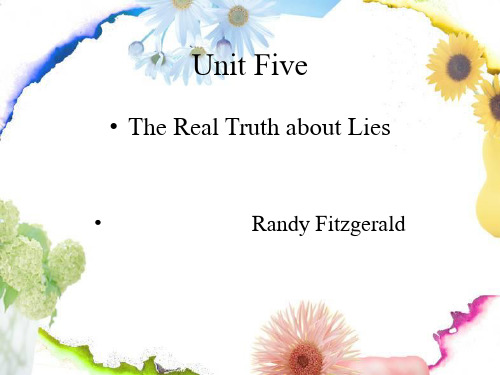
• 使免遭;解除 • The country had until now been spared the violence occurring elsewhere.
常用词组
• spare someone‘s blushes不以过分的话使某人 难为情 • spare no expense不惜任何代价 • spare the rod and spoil the child孩子不打不成器 • spare a thought for记得 • spare a thought for our volunteer group at Christmas. • 圣诞节别忘了我们的志愿者组织。
volunteer
• v. 自愿去做,主动请求去做 • We all volunteered to paint the house. • A number of university students have volunteered to drive buses while the strike lasts. • The doctor who had volunteered to settle down in the poor village became the chief fable of the villagers.
Prevarication---prevaricate-prevaricator
• speak or act in an evasive way • 支吾,搪塞,推诿,含糊其辞 • He seemed to prevaricate when journalists asked pointed questions.
• • • • • • • • • •
习惯用语 农业信用机关agricultural credit institute 航空学院aviation institute 函授学院correspondence institute 戏剧学院drama institute 工学院engineering institute 海运学院mercantile marine institute 矿业学院mining institute 石油学院petroleum institute 体育学院physical culture institute
大学英语综合教程1unit5教案
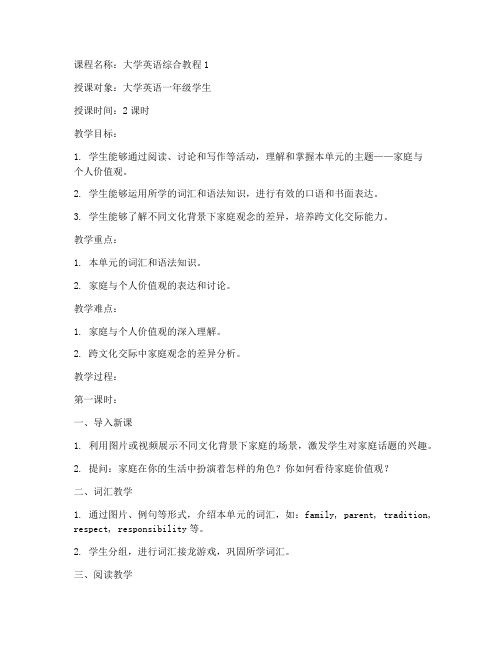
课程名称:大学英语综合教程1授课对象:大学英语一年级学生授课时间:2课时教学目标:1. 学生能够通过阅读、讨论和写作等活动,理解和掌握本单元的主题——家庭与个人价值观。
2. 学生能够运用所学的词汇和语法知识,进行有效的口语和书面表达。
3. 学生能够了解不同文化背景下家庭观念的差异,培养跨文化交际能力。
教学重点:1. 本单元的词汇和语法知识。
2. 家庭与个人价值观的表达和讨论。
教学难点:1. 家庭与个人价值观的深入理解。
2. 跨文化交际中家庭观念的差异分析。
教学过程:第一课时:一、导入新课1. 利用图片或视频展示不同文化背景下家庭的场景,激发学生对家庭话题的兴趣。
2. 提问:家庭在你的生活中扮演着怎样的角色?你如何看待家庭价值观?二、词汇教学1. 通过图片、例句等形式,介绍本单元的词汇,如:family, parent, tradition, respect, responsibility等。
2. 学生分组,进行词汇接龙游戏,巩固所学词汇。
三、阅读教学1. 学生阅读课文,了解文章大意。
2. 教师引导学生分析文章结构,提炼出文章的主旨大意。
3. 学生讨论文章中的观点,表达自己的看法。
四、语法教学1. 介绍本单元的语法知识,如:现在进行时、过去完成时等。
2. 学生通过例句练习,掌握语法知识。
五、课堂小结1. 教师总结本节课所学内容,强调重点和难点。
2. 学生回顾所学词汇和语法知识。
第二课时:一、复习导入1. 回顾上一节课所学内容,检查学生对词汇和语法的掌握情况。
2. 学生进行口语练习,用所学词汇和语法知识描述家庭生活。
二、写作教学1. 学生根据课文内容,撰写一篇关于家庭价值观的短文。
2. 教师指导学生修改作文,注意语法、词汇和表达方式。
三、课堂讨论1. 学生分组讨论,分享自己对家庭价值观的看法。
2. 教师引导学生分析不同文化背景下家庭观念的差异。
四、课堂小结1. 教师总结本节课所学内容,强调家庭价值观的重要性。
全新版大学英语(第二版)综合教程_第四册_Unit 5 Never Judge by Appearances——A Friend in Need
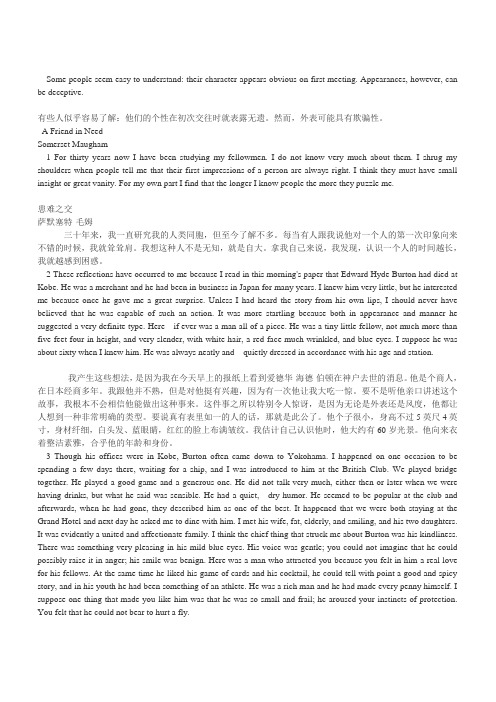
Some people seem easy to understand: their character appears obvious on first meeting. Appearances, however, can be deceptive.--------------------------------------------------------------------------------有些人似乎容易了解:他们的个性在初次交往时就表露无遗。
然而,外表可能具有欺骗性。
A Friend in NeedSomerset Maugham1 For thirty years now I have been studying my fellowmen. I do not know very much about them. I shrug my shoulders when people tell me that their first impressions of a person are always right. I think they must have small insight or great vanity. For my own part I find that the longer I know people the more they puzzle me.--------------------------------------------------------------------------------患难之交萨默塞特·毛姆三十年来,我一直研究我的人类同胞,但至今了解不多。
每当有人跟我说他对一个人的第一次印象向来不错的时候,我就耸耸肩。
我想这种人不是无知,就是自大。
拿我自己来说,我发现,认识一个人的时间越长,我就越感到困惑。
2 These reflections have occurred to me because I read in this morning's paper that Edward Hyde Burton had died at Kobe. He was a merchant and he had been in business in Japan for many years. I knew him very little, but he interested me because once he gave me a great surprise. Unless I had heard the story from his own lips, I should never have believed that he was capable of such an action. It was more startling because both in appearance and manner he suggested a very definite type. Here if ever was a man all of a piece. He was a tiny little fellow, not much more than five feet four in height, and very slender, with white hair, a red face much wrinkled, and blue eyes. I suppose he was about sixty when I knew him. He was always neatly and quietly dressed in accordance with his age and station.--------------------------------------------------------------------------------我产生这些想法,是因为我在今天早上的报纸上看到爱德华·海德·伯顿在神户去世的消息。
- 1、下载文档前请自行甄别文档内容的完整性,平台不提供额外的编辑、内容补充、找答案等附加服务。
- 2、"仅部分预览"的文档,不可在线预览部分如存在完整性等问题,可反馈申请退款(可完整预览的文档不适用该条件!)。
- 3、如文档侵犯您的权益,请联系客服反馈,我们会尽快为您处理(人工客服工作时间:9:00-18:30)。
2.Pre-reading of Text B (15mins)
3. Speaking Practice (20mins)
4.Practical Writing (30 mins)
重 点
Global understanding of Text A, related cultural knowledge and language points.
6.Write a letter of sympathy or condolence in an appropriate way.
重点与难点:
重点:阅读部分中的核心词汇及短语、句型结构等语言点。
难点:阅读部分的篇章结构及写作特点分析。
课时分配:
1stPeriod:Pre-reading;Global reading (Text A)
2.Appreciate thewriting strategy and styledemonstrated inTextA(to set the tone of irony by choice of words, selection of details, use of quotation marks, etc.);
2ndPeriod:While-reading(Text A)
3rdPeriod:Post-reading practice(Text A) & Pre-reading (Text B)
4thPeriod:Comprehensive Language Practice & Assignments (Text B)
1.Express fluently on the related theme;
2. Writing practice
作业
1. Finish exercises ofText A;
2.How do you understand thetitle “Work to Live or Live to Work”?ຫໍສະໝຸດ Unit1课型理论
Text A
TextB
目 的 与 要 求
1.Grasp the main idea (theauthor tries to define a typical workaholic in the American corporate worldwithstory of Phil) andthestructure ofText A;
3.Understand the cultural background related to the content;
4.Master the key language points and learn how to use them in context
1.Understand the cultural background related to the content;
2.Express themselves more freely on the theme ofWork to Live or Live to Workafter doing a series of theme-related reading, listening, speaking and writing activities;
3.Master the key language points andlearn how to use them in context;
4.Understand the cultural background related to the content;
5.Express themselves more freely on the theme ofWork to Live or Live to Workafter doing a series of theme-related reading, listening, speaking and writing activities;
3.Write a letter of sympathy or condolence in an appropriate way.
教 学 时 间
1.Pre-readingActivities(15mins)
2.Global Reading (25mins)
nguage PointsandSentence Interpretation(60mins)
Writing a letter of sympathy or condolence in an appropriate way and post-reading practice after Text A
难点
1.Structure analysis of the text;
2.Sentences with complex structure
潍坊医学院单元教案
教学单元名称
Unit5Work to Live or Live to Work
学时
4
目的与要求:
1.Grasp the main idea (theauthor tries to define a typical workaholic in the American corporate worldwithstory of Phil) andthestructure ofText A;
教学方法:
通过教师引导,采用对话、小组讨论、问答等方法,激发学生的学习主动性,互动性。使多种语言技能在同一主题下通过多种交际环境和练习形式反复运用、深化,充分体现“学—练—会—用”的完整学习过程。
教学手段:
运用板书、计算机、多媒体、课件等教学手段。
潍坊医学院课时教案
课程名称
全新版大学英语综合教程1
授课章节
2.Appreciate thewriting strategy and styledemonstrated inTextA(to set the tone of irony by choice of words, selection of details, use of quotation marks, etc.);
